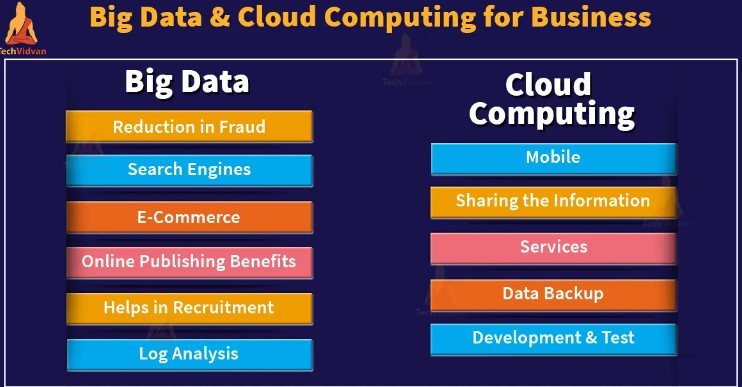Big data and cloud computing are two technologies that have transformed the way businesses operate in today’s digital age. While big data provides valuable insights into customer behavior and business performance, cloud computing enables businesses to store and process massive amounts of data in a flexible and scalable manner. In this article, we will explore the benefits of combining big data and cloud computing and identify key considerations for businesses.
Introduction
Big data refers to the massive amounts of data generated by individuals, organizations, and machines. Cloud computing refers to the delivery of computing services over the internet, including storage, processing, and analysis of data. By combining these two technologies, businesses can leverage big data analytics to gain valuable insights while storing and processing data in a scalable and flexible manner.
Benefits of Combining Big Data and Cloud Computing
There are several benefits of combining big data and cloud computing, including:
Scalability
Cloud computing provides businesses with the ability to scale their storage and processing capacity up or down based on their needs, enabling them to store and analyze massive amounts of data without the need for costly on-premises infrastructure.
Flexibility
Cloud computing enables businesses to store and process data in a flexible manner, with the ability to access data from anywhere, at any time, and on any device.
Cost Savings
By leveraging cloud computing, businesses can reduce their capital expenditures on hardware and infrastructure, and instead pay for only the resources they use on a pay-as-you-go basis.
Faster Time-to-Insight
By using cloud computing to store and process data, businesses can reduce the time it takes to gain insights from big data analytics, enabling them to make more informed decisions in real-time.
Considerations for Businesses
While there are many benefits to combining big data and cloud computing, there are also several co犀利士
nsiderations that businesses should be aware of, including:
Data Privacy and Security
Data privacy and security are critical considerations when storing and processing data in the cloud. Businesses must ensure that they comply with data privacy regulations and implement robust security measures to protect their data.
Data Quality and Governance
Data quality and governance are critical to the success of big data analytics initiatives. Businesses must ensure that they have processes in place to ensure data accuracy and integrity, and that they comply with data governance regulations.
Cloud Service Providers
Businesses must carefully evaluate cloud service providers to ensure that they offer the necessary features and capabilities to support big data analytics initiatives, and that they comply with relevant regulations and standards.
Conclusion
Combining big data and cloud computing can provide businesses with a powerful platform for storing and analyzing massive amounts of data in a flexible and scalable manner. By prioritizing considerations such as data privacy and security, data quality and governance, and careful evaluation of cloud service providers, businesses can successfully leverage big data and cloud computing to drive business performance and gain a competitive advantage.
FAQs
- What is big data?
Big data refers to the massive amounts of data generated by individuals, organizations, and machines.
- What is cloud computing?
Cloud computing refers to the delivery of computing services over the internet, including storage, processing, and analysis of data.
- What are the benefits of combining big data and cloud computing?
Benefits of combining big data and cloud computing include scalability, flexibility, cost savings, and faster time-to-insight.
- What are the considerations for businesses when combining big data and cloud computing?
Considerations for businesses when combining big data and cloud computing include data privacy and security, data quality and governance, and careful evaluation of cloud service providers.
- What skills and expertise are needed for implementing big data and cloud computing initiatives?
Implementing big data and cloud computing initiatives requires expertise in data analytics, cloud computing, and cybersecurity, among others. Additionally, knowledge of relevant regulations and standards is also important.
- What are some examples of industries that can benefit from combining big data and cloud computing?
Industries that can benefit from combining big data and cloud computing include healthcare, finance, retail, and manufacturing, among others.
- How can businesses ensure data privacy and security when using cloud computing for big data analytics?
Businesses can ensure data privacy and security when using cloud computing for big data analytics by implementing robust security measures such as encryption, access controls, and monitoring, and by complying with relevant data privacy regulations.
- What are some best practices for implementing big data and cloud computing initiatives?
Best practices for implementing big data and cloud computing initiatives include prioritizing data privacy and security, ensuring data quality and governance, evaluating cloud service providers carefully, and investing in ongoing education and training for employees.
- How can businesses stay up-to-date with the latest trends and innovations in big data and cloud computing?
Businesses can stay up-to-date with the latest trends and innovations in big data and cloud computing by attending industry conferences and events, participating in online communities and forums, and investing in ongoing education and training for their employees.
- What is the future of big data and cloud computing?
The future of big data and cloud computing is likely to be shaped by emerging technologies such as artificial intelligence and machine learning, as well as evolving customer needs and preferences. As businesses continue to invest in big data and cloud computing, it will be important to stay up-to-date with the latest trends and innovations in order to remain competitive and drive business performance.
Read More :
- The Impact of Big Data on Customer Experience : Trends and Insights
- Big Data and Blockchain : Synergies and Implications
- 壯陽藥
g.sekolahbahasainggris.co.id/big-data-and-real-time-analytics/”>Big Data and Real-Time Analytics : Innovations and Best Practices - The Benefits of Using Cloud Computing for Big Data Analytics
- How Big Data is Revolutionizing the Retail Industry
